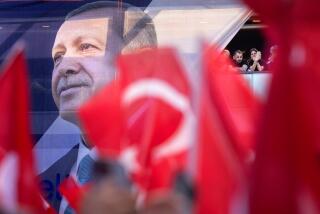Turks Conflicted on U.S. Presence
- Share via
AVCILAR, Turkey — “We are helping the infidels kill Muslims. We must drive those Americans out of here,” said the pale, angry man, carefully adjusting his white skullcap. “That is what I tell my congregation every day.”
Ferhan Ozturk, 40, is the imam in this muddy village on the road to Iraq in southeastern Turkey. Over the past week in the nearby town of Kiziltepe, several hundred U.S. troops have been converting a flour mill and warehouse complex into a logistics base for a war against Iraq.
Shiny new barbed wire encircles the compound. U.S. troops try to communicate in sign language with Turkish forces standing guard. Gaggles of scruffy schoolchildren gawk at the Americans, only to be shooed away.
“I went over to see them the other day, to ask the Americans what they wanted,” Ozturk said. “Actually, I also wanted to find out whether they could give my sons a job.”
Ozturk’s ambivalence mirrors the sentiment in this region populated mainly by Kurds but also by ethnic Arabs and Syrian Orthodox Christians. As in much of this predominantly Muslim nation of 67 million people, antiwar feelings run strong here, but people are poor -- and if they cannot stop a war, they want to capitalize on it.
Early this month, parliament refused to allow the deployment of 62,000 U.S. combat troops in Turkey for an assault on Iraqi President Saddam Hussein. Now, with Turkish leaders under American pressure to resubmit the proposal to lawmakers, antiwar protests are gathering pace. Hundreds of demonstrators chanting “Yankee, go home!” clashed with Turkish security forces Wednesday outside the Mediterranean port of Iskenderun as U.S. military personnel continued to unload material from dozens of Navy ships anchored off the coast.
Television images of gun-toting U.S. troops at the logistics base in Kiziltepe have prompted accusations that the Americans are acting outside their mandate. The Turkish government insists that the Americans are part of a 3,500-member team of military engineers and technicians that parliament authorized last month to upgrade 10 Turkish air bases and two Turkish ports for the proposed troop deployment.
The country’s main opposition leader, Deniz Baykal, said the U.S. troops are “illegally occupying” Turkish territory under a separate February agreement, disclosed only this week, to let the Americans set up the logistics bases at the flour mill and eight other sites.
Baykal demanded a parliamentary investigation of the Americans’ status. His motion was defeated Wednesday, but Turkey’s armed forces, which support a U.S. deployment, say they will look into the matter.
Although Baykal’s Republican People’s Party voted as a bloc in parliament against U.S. deployment, one of its lawmakers stands to profit from a war. Residents here say the lawmaker, Mahmut Duyan, owns the flour mill and is renting it out to the Americans.
In Kiziltepe, the threat of war looms. U.S. and Turkish fighter jets screech overhead, scarring blue skies with trails of smoke. Convoys of Turkish armored personnel carriers trundle past, en route to the Iraqi border.
People say they dread what is coming. They suffered not only from the 1991 Persian Gulf War but also from a 15-year Kurdish separatist uprising that claimed more than 35,000 lives before Turkey quelled it in 1999.
“As usual, we Kurds will pay the highest price for this war,” said Kazim Tas, motioning toward a rusting oil tanker sitting outside the boxy concrete house he shares with his wife, 10 sons and daughters, and more than a dozen relatives.
Like most of Kiziltepe’s residents, Tas and his sons have made a living ferrying crude oil from refineries in Mosul and Kirkuk, in northern Iraq. That trade was halted a month ago as Turkey sealed its 200-mile border with Iraq and began a troop buildup there.
Turkey says it plans to send tens of thousands of its own forces into northern Iraq, in part to prevent a refugee exodus like the one that inundated Turkey with half a million Iraqi Kurds right after the 1991 war. The Turkish army also wants to deter Iraqi Kurds, who have enjoyed de facto autonomy in northern Iraq since the end of that conflict, from creating their own state after Hussein is gone. Sympathy for Turkey’s all-but-defeated Kurdish guerrillas is palpable here, and it translates into sentiment against America. By threatening to invade Iraq, “the Americans are trying to stir up another war between the Turks and the Kurds,” said Ilhan Oymen, 27, a marketing executive in Kiziltepe. “We must not fall into this trap.”
“We are also very worried about the impact the Americans will have on the moral values of our society,” said Bedrettin Karaboga, whose biscuit and macaroni factory shares an industrial zone with the new U.S. logistics base.
“Soon we will have bars and discos catering to these Americans. I am truly worried, especially for our youth,” he said, pausing to answer the phone.
Suddenly his face lighted up. “The Americans might be renting my other grain factory,” he announced after hanging up. “Well, I am a businessman after all.”
Ozturk, the imam, said he has been unable to figure out whether there is work for his sons at the logistics base.
“In any event,” he said, “the rich as always will be the ones to benefit with their land and their factories, and we poor will only get poorer. And if that is Allah’s will, we must accept it.”
More to Read
Sign up for Essential California
The most important California stories and recommendations in your inbox every morning.
You may occasionally receive promotional content from the Los Angeles Times.













